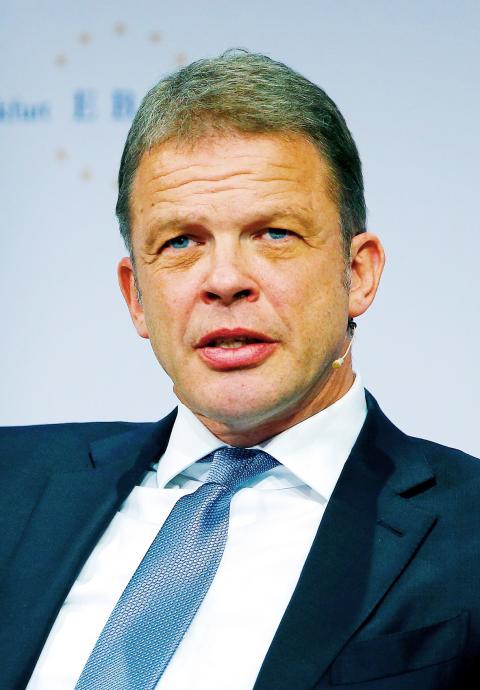Deutsche Bank AG is not at risk of a takeover, chief executive officer Christian Sewing told a German weekly paper after its shares fell to a record low on Friday last week in the wake of a two-day raid related to money laundering allegations.
Speculation about a possible merger has continued, despite the bank’s dismissal in September of reports that it could consider tie-ups with Switzerland’s UBS AG or German peer Commerzbank AG.
“I don’t have any indication of that,” Sewing told Bild am Sonntag. “We are on track to make our first profit for three years. It is only a matter of time before this progress is reflected in the share price.”

Photo: Reuters
Sewing’s remarks followed the two-day raid as part of an investigation linked to the so-called Panama Papers leak of documents about offshore finance.
Police searched the offices of all the bank’s board members, Sewing said.
“But that is okay, I don’t have a problem with that. I want this matter to be cleared up as soon as possible,” he told the newspaper.
Investigators are looking at the activities of unidentified Deutsche Bank employees alleged to have helped clients set up offshore firms to launder money, the Frankfurt prosecutors’ office said.
“It’s about two employees who, at the time, helped work through everything surrounding the issue of the Panama Papers. In my view the presumption of innocence clearly applies until proven otherwise,” Sewing told the paper.
“Since the publication of the Panama Papers in 2016, we have reviewed the whole issue and, in doing so, cooperated closely with the regulatory authorities. For us the case was concluded,” he said.
Asked whether he had made any mistakes, Sewing said: “I am at peace with myself and I am doing my job as well as I can.”
“Of course, I would never say that I’m not making mistakes, but if I do, I correct them as quickly as possible,” he said.

The US dollar was trading at NT$29.7 at 10am today on the Taipei Foreign Exchange, as the New Taiwan dollar gained NT$1.364 from the previous close last week. The NT dollar continued to rise today, after surging 3.07 percent on Friday. After opening at NT$30.91, the NT dollar gained more than NT$1 in just 15 minutes, briefly passing the NT$30 mark. Before the US Department of the Treasury's semi-annual currency report came out, expectations that the NT dollar would keep rising were already building. The NT dollar on Friday closed at NT$31.064, up by NT$0.953 — a 3.07 percent single-day gain. Today,

‘SHORT TERM’: The local currency would likely remain strong in the near term, driven by anticipated US trade pressure, capital inflows and expectations of a US Fed rate cut The US dollar is expected to fall below NT$30 in the near term, as traders anticipate increased pressure from Washington for Taiwan to allow the New Taiwan dollar to appreciate, Cathay United Bank (國泰世華銀行) chief economist Lin Chi-chao (林啟超) said. Following a sharp drop in the greenback against the NT dollar on Friday, Lin told the Central News Agency that the local currency is likely to remain strong in the short term, driven in part by market psychology surrounding anticipated US policy pressure. On Friday, the US dollar fell NT$0.953, or 3.07 percent, closing at NT$31.064 — its lowest level since Jan.

The New Taiwan dollar and Taiwanese stocks surged on signs that trade tensions between the world’s top two economies might start easing and as US tech earnings boosted the outlook of the nation’s semiconductor exports. The NT dollar strengthened as much as 3.8 percent versus the US dollar to 30.815, the biggest intraday gain since January 2011, closing at NT$31.064. The benchmark TAIEX jumped 2.73 percent to outperform the region’s equity gauges. Outlook for global trade improved after China said it is assessing possible trade talks with the US, providing a boost for the nation’s currency and shares. As the NT dollar

The Financial Supervisory Commission (FSC) yesterday met with some of the nation’s largest insurance companies as a skyrocketing New Taiwan dollar piles pressure on their hundreds of billions of dollars in US bond investments. The commission has asked some life insurance firms, among the biggest Asian holders of US debt, to discuss how the rapidly strengthening NT dollar has impacted their operations, people familiar with the matter said. The meeting took place as the NT dollar jumped as much as 5 percent yesterday, its biggest intraday gain in more than three decades. The local currency surged as exporters rushed to